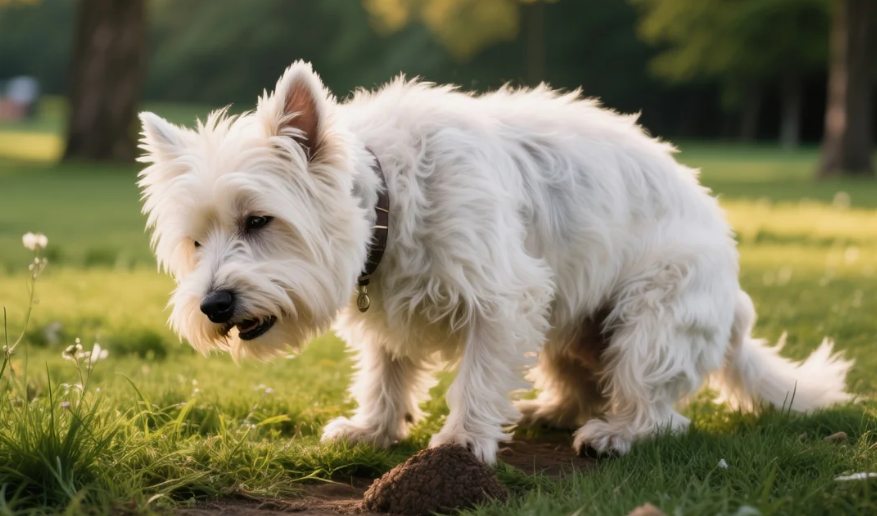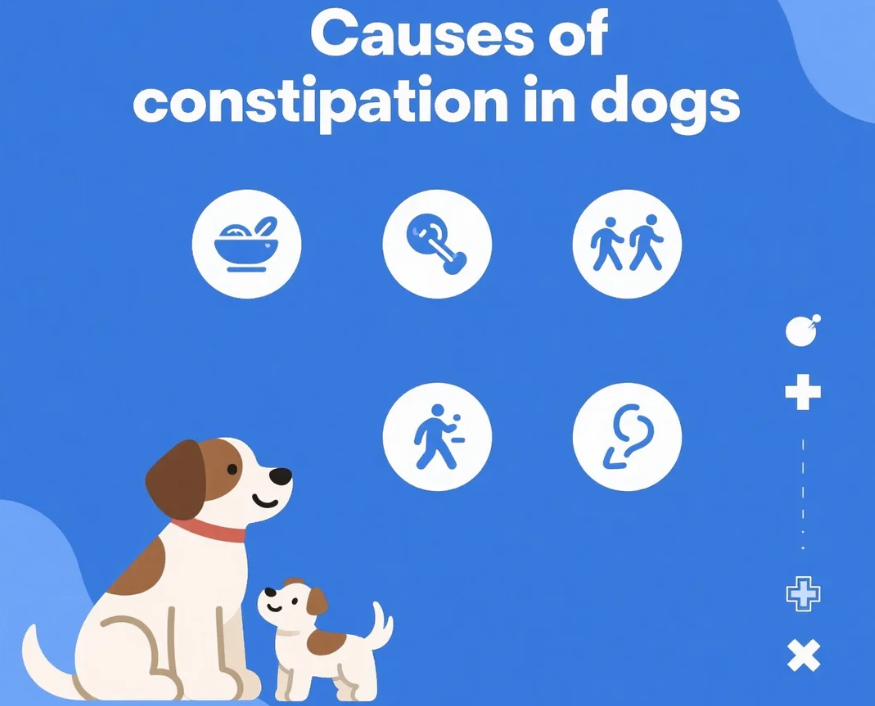Dog Constipation: Causes, Symptoms, Remedies, and Prevention

Dog constipation is a problem that many pet parents face. It can be stressful for your dog and worrying for you. Watching your pup struggle to poop—or seeing them cry out in discomfort—creates a deep sense of concern. You want nothing more than to ease their pain and help them feel better. Fortunately, constipation in dogs is often manageable with the right knowledge and care.
This guide explains everything you need to know about dog constipation. You’ll learn the causes, symptoms, home remedies, prevention tips, and when it’s time to call your vet.
What Is Dog Constipation?
Dog constipation happens when your dog has difficulty passing stool or has fewer bowel movements than usual. A healthy dog usually poops once or twice every day. If your dog hasn’t gone for more than 48 hours, or if they strain without results, constipation is likely.
In addition, stools may look hard, dry, or like small pebbles. In severe cases, dogs may not pass stool at all. That can lead to bloating, discomfort, and dangerous blockages.
Common Causes of Dog Constipation
Understanding why dog constipation happens helps you act quickly. Several factors can trigger the problem.
Dehydration
Without enough water, stools turn dry and compact. As a result, they are harder to pass.
Low-Fiber Diet
Fiber supports smooth digestion. If your dog’s food has little fiber, constipation becomes more likely.
Lack of Exercise
Sedentary dogs often develop slower digestion. Regular activity keeps the intestines moving and prevents constipation.
Ingesting Foreign Objects
Dogs sometimes eat bones, toys, or hair. These items can create blockages that make pooping difficult.
Underlying Medical Conditions
Certain health problems increase the risk of constipation. Examples include hypothyroidism, enlarged prostate, hernias, and spinal issues.
Medication Side Effects
Some medications slow digestion. Pain relievers, iron supplements, and diuretics are common culprits.

Symptoms of Dog Constipation
You can often spot dog constipation by observing your dog’s behavior and bathroom habits. Look for these signs:
- Straining or crouching without success
- Hard, dry, or pebble-like stools
- Whimpering or showing pain when trying to poop
- Reduced appetite
- Low energy or lethargy
- Vomiting, especially in severe cases
If these symptoms last more than a day or two, you need to act.
Effective Home Remedies for Dog Constipation
Mild dog constipation usually responds well to safe home remedies. By taking small steps, you can bring comfort and relief to your pet.
Increase Hydration
Always provide clean, fresh water. You can also add low-sodium chicken broth to encourage drinking.
Add Fiber to the Diet
Pumpkin puree is one of the best natural remedies. Add a spoonful to your dog’s food, and it will soften stool. Sweet potatoes, oats, and psyllium husk (vet-approved) also work well.
Encourage Regular Exercise
Walking and playing keep your dog active. These activities stimulate digestion and help the colon function properly.
Switch to Canned Food
Wet dog food contains more moisture than kibble. Adding it to the diet makes stools easier to pass.
Natural Oils
Mix a small amount of olive oil or coconut oil into meals. For small dogs, use about a teaspoon; for larger dogs, one tablespoon is enough.
Important Note:
Always talk to your vet before using supplements or oils. Do not give your dog human laxatives—they can be dangerous.
When to Call the Vet
While some cases are mild, dog constipation can also be a warning sign. Call your vet if your dog:
- Hasn’t pooped in over 48 hours
- Shows pain, bloating, or severe straining
- Vomits often
- Passes bloody stool
- Struggles with constipation repeatedly
Chronic constipation can develop into megacolon. In this condition, the colon stretches and loses its ability to contract. Veterinary care is the only safe treatment.
Preventing Dog Constipation
The best way to deal with dog constipation is to prevent it before it starts. With a few consistent habits, you can keep your dog’s digestion healthy.
Balanced Nutrition
Feed your dog high-quality food with enough fiber. Avoid bones and hard-to-digest human foods.
Plenty of Water
Encourage hydration. A pet water fountain can make drinking more fun.
Daily Exercise
Walks and playtime are vital. They maintain good digestion and overall health.
Grooming
Brush your dog often. This prevents them from swallowing too much hair, which can cause blockages.
Routine Vet Care
Regular checkups catch hidden health problems early. That reduces the risk of constipation.
Emotional Impact of Dog Constipation
It hurts to see your dog struggle with constipation. They can’t tell you what’s wrong, but their body language says enough. When they whine, strain, or appear uncomfortable, you feel their stress.
By responding with care—adding water, adjusting food, or visiting the vet—you show your dog that they can count on you. These moments of compassion strengthen your bond. They remind you why the relationship between human and dog is so special.
FAQ: Dog Constipation
Q1: How long can a dog go without pooping before it’s serious?
If your dog hasn’t pooped for more than 48 hours, contact your veterinarian.
Q2: Can pumpkin help dog constipation?
Yes. Plain pumpkin puree adds fiber and moisture, which softens stool.
Q3: Can stress cause constipation in dogs?
Yes. Stress can affect digestion, leading to constipation or diarrhea.
Q4: Are human laxatives safe for dogs?
No. Human laxatives may be toxic. Always use vet-approved treatments.
Q5: What’s the difference between constipation and obstruction?
Constipation is difficulty passing stool. Obstruction means a physical blockage, which is an emergency.
Key Takeaways
- Dog constipation is common but treatable.
- Causes include dehydration, low fiber, lack of exercise, and medical issues.
- Symptoms are straining, hard stools, and in severe cases, vomiting.
- Remedies like pumpkin, water, exercise, and canned food often help.
- Call your vet if constipation lasts over 48 hours or worsens.
- Prevent problems with hydration, nutrition, exercise, grooming, and vet care.
Final Thoughts
Dog constipation may look like a small issue, but it affects your dog’s comfort and well-being. By paying attention to their bathroom habits, keeping them active, and making sure they stay hydrated, you can protect their health.
If constipation continues, don’t wait. Your veterinarian can find the cause and recommend safe treatment.
Most importantly, remember that your dog trusts you to care for them. Every step you take toward their health deepens the love and loyalty you already share.
One Response